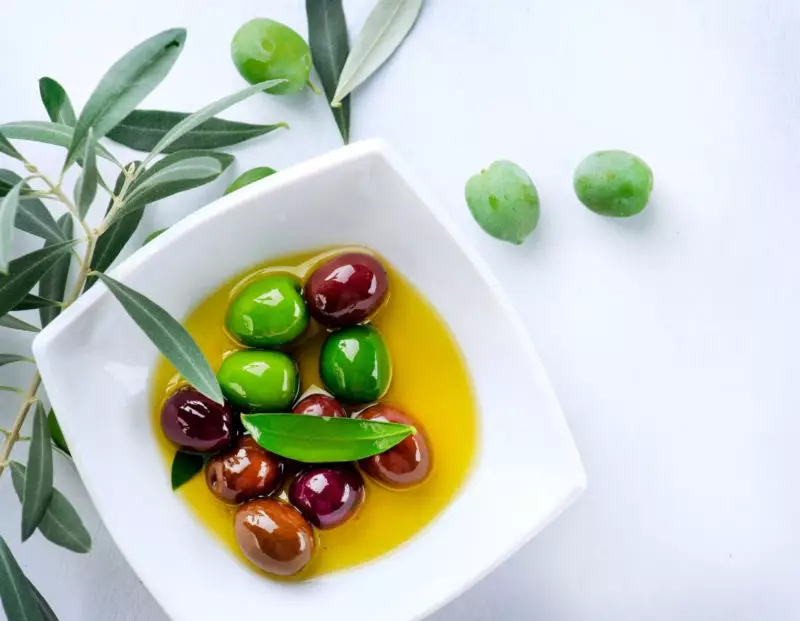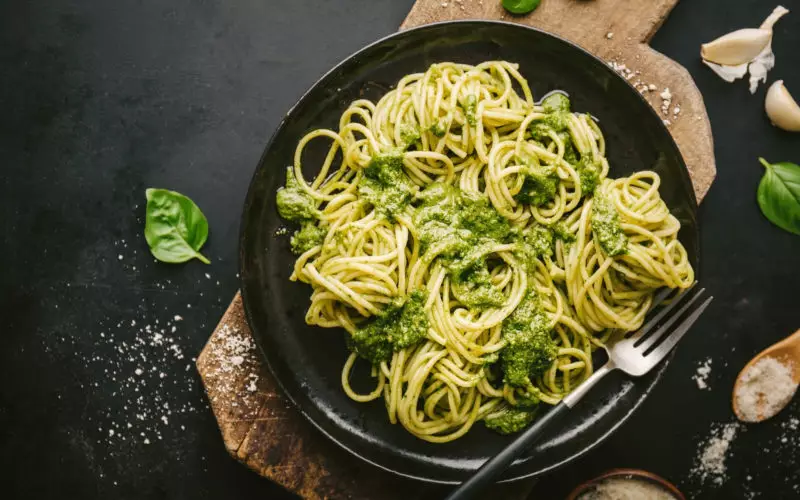
A key component of the Mediterranean diet is olive oil. It is recommended as the primary source of added fat. Besides, people adhering to the Mediterranean diet are encouraged to use olive oil (extra virgin olive oil in particular) as their main cooking oil. The reason for this is that olive oil as part of this diet is associated with various health benefits: from reduced risk of heart disease to improved cognitive function.
That being said, it is often unclear what type and how much olive oil to use for optimal health benefits.
This article guides you through the food list of a typical Mediterranean diet and gives you tips on what type of olive oil to use and how much to consume. We will also look into the health benefits of olive oil as part of the Mediterranean diet.
Let’s get started!
Mediterranean diet food list
The typical Mediterranean diet includes the following foods [1] [2]:
- All fruits: fresh, frozen, dried
- All vegetables: fresh, frozen, dried, canned
- Whole grains: brown rice, pasta, bread, cereals, oats
- Legumes: lentils, beans, chickpeas, peas, soy
- Nuts and seeds: e.g., chia, pumpkin, sesame seeds, macadamia, almonds, cashews, hazelnuts, walnuts, peanuts, pistachios, pine seeds
- Herbs and spices: e.g., pepper, oregano, basil, rosemary, bay leaf, cumin
- Olive oil: it can be used in combination with other vegetable oils like sesame, walnut, canola, avocado oil
- Fish and seafood: at least twice a week, as it provides you with Omega-3 fatty acids. Fatty fish like salmon, mackerel, and sardines is recommended.
- Poultry and eggs: small portions a few times weekly; white poultry meat is preferred
- Low-fat dairy foods: small portions a few times a week
- Lean meat: limited to a few times per month
The consumption of processed foods, as well as foods rich in refined sugars, sodium, saturated and trans fats should be limited.

How much olive oil should you have on Mediterranean diet
Olive oil is rich in monounsaturated fat and Omega-6 fatty acids.
For reference, the source notes that the total daily fat intake should be 20-35% of the total daily calories consumed: 44-77 grams.
In a PREDIMED study evaluating the health effects of olive oil intake as part of the Mediterranean diet, participants were given 1 liter extra virgin olive oil per month. This way, the individuals in the study consumed about 33 grams (approximately 4 tablespoons) of olive oil per day. This amount of olive oil was enough for the individuals to benefit from the health benefits related to olive oil consumption (see the last section). [4]
Furthermore, replacing a teaspoon of butter, margarine, animal fat, or mayonnaise with 1 teaspoon olive oil may reduce the risk of heart disease and coronary heart disease by respectively 5% and 7%. [5]

Mediterranean diet what kind of olive oil?
The MayoClinic notes that olive oil is the primary source of added fat in the typical Mediterranean diet. [6] However, there are different types of olive oil, and not all of them are suitable for Mediterranean diet:
- Extra virgin olive oil (cold-pressed unrefined)
- Virgin olive oil (unrefined)
- Refined olive oil (lower quality than extra virgin and virgin)
- Pure olive oil (not really pure; low-quality; blend of unrefined and refined olive oil)
- Pomace olive oil (lowest quality, made from residues of other olive oil extractions)
The best type of olive oil to use if you stick to Mediterranean diet is Extra virgin olive oil (EVOO.) EVOO is the purest, most characteristic component of the diet and is associated with most health benefits. [7] Virgin olive oil is also a good option, but EVOO is preferred.
Refined, pure and pomace olive oils available in the supermarket are of lower quality and may even be adulterated. They may contain other oils like sunflower or canola oil, which makes them diluted. Therefore, they are not associated with the health benefits typical for EVOO and are not a good addition to the Mediterranean diet.

Olive oil: Health benefits
Evidence suggests that long term adherence to Mediterranean diet with sufficient consumption of EVOO (and not other types of olive oil) is associated with the following health benefits [7] [8]:
- Positive effects on inflammation
- Lower risk of obesity and type 2 diabetes
- Positive impact on asthma and allergy symptoms
- Prevention of artery buildup and atherosclerosis
- Cholesterol balance
- Reduced Body Mass Index BMI
- Lower risk of heart disease
According to the 2014 PREDIMED study, daily extra virgin olive oil intake may [4]:
- Reduce the risk of heart disease development by 39%
- Reduce the risk of cardiovascular mortality by 48% (risk decreasing with additional 7% with every 10 additional grams of EVOO)
Furthermore, Yale School of Medicine considers EVOO a superfood that may prevent neurodegenerative diseases and lower high blood pressure when consumed daily. [9]
Keep in mind that these benefits refer to moderate EVOO consumption and not to other types of olive oil.








